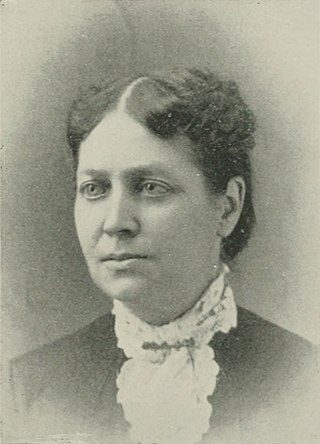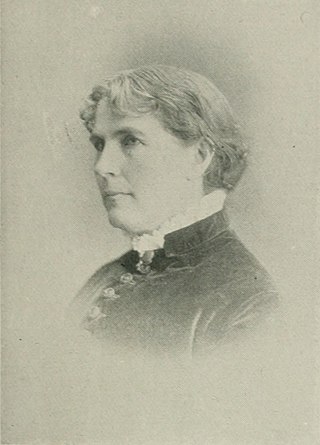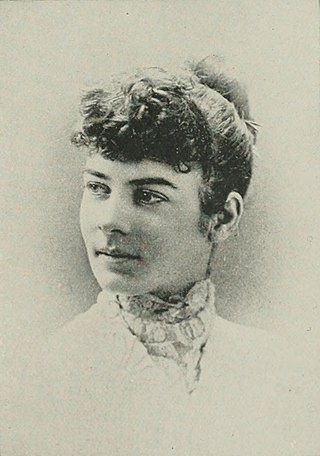
José-Maria de Heredia was a Cuban-born French Parnassian poet. He was the fifteenth member elected for seat 4 of the Académie française in 1894.
Philip Bourke Marston was an English poet.

Carlotta Perry, the pen name of Charlotte Augusta Perry, was an American writer of poetry and prose. She was among a group of premier women poets of the late 19th century. Her poems, children's stories, and short stories were published in many of the most read publications of the time including Harper's Magazine, Godey's Lady's Book and Lippincott's Monthly Magazine. Some of her verse can still be found today in Christian newsletters and even in an ad for a paint company describing their shades of white. Known mostly for her poetry, she was also a journalist and was active in many of the journalism and women's organizations during her working life.

Lilian Whiting was an American journalist, editor, and author of poetry and short stories. She served as literary editor of the Boston Evening Traveller (1880–1890), editor-in-chief of the Boston Budget (1890–93), and afterward, spent much of her time in Europe. Whiting was the author of The World Beautiful, From Dreamland Sent, a book of poems, A Study of the Life and Poetry of Elizabeth Barrett Browning, A Record of Kate Field, The World Beautiful in Books, Boston Days, Florence of Landor, The Outlook Beautiful, Italy, the Magic Land, Paris the Beautiful, and others.

Alice Williams Brotherton was an American author of poetry, essays, reviews, children's stories, and lyrics. Though she hailed from Indiana, she lived most of her life in Cincinnati, Ohio, serving as president of the Cincinnati Woman's Press Club. She wrote critical essays and addresses on Shakespeare, while many of her poems were set to music in the United States and in England. Contemporary poets of Ohio included Helen L. Bostwick and Kate Brownlee Sherwood.

Hattie Tyng Griswold was an American author of the long nineteenth century. She wrote many stories, sketches, and poems. Born in Boston, Griswold relocated with her family to Columbus, Wisconsin, in 1850, where, in the course of time, she married, raised her children, and did much of her work as an author. Her home was a meeting place of many of the notable people of the day, for she had an extensive personal acquaintance with literary and other celebrities. The books by which she is best-known are: Apple Blossoms, Waiting on Destiny, Lucile and Her Friends, and The Home Life of Great Authors. "Under the Daisies" is one of her best-known poems. She wrote stories for the Home Journal of New York, The Knickerbocker, Madison State Journal, Old and New, The Christian Register, and Boston Commonwealth. Griswold served as president of the Woman's Christian Temperance Union in her locale.

Lavilla Esther Allen, also known as Esther Lavilla Allen, was an American author, poet, and reader.
Elisabeth Cavazza was an American author, journalist, and music critic.

Helen Hinsdale Rich, known as "The Poet of the Adirondacks", was a 19th-century American writer of poetry. She wrote and lectured in the causes of temperance and women's rights. She was the first woman of northern New York to embrace woman suffrage. Her poetry appeared in the Springfield Republican, Boston Transcript, the Overland Monthly, and other prominent journals. Her volume of poems, A Dream of the Adirondacks, and Other Poems, was compiled by Charles G. Whiting. Her Madame de Stael had the endorsement of eminent scholars as a literary lecture. Her "Grand Armies" was considered a brilliant Memorial Day address. She excelled in poems of affection. Her "Justice in Leadville", in the style of Bret Harte, was pronounced by The Spectator to be worthy of that poet or of John Hay. Rich died in 1915.

Helen Marr Hurd was an American teacher and poet of the long nineteenth century. Living with severe myopia, she taught in thirty schools—until her eyes made teaching impossible. Thereafter, she devoted her time to literary pursuits. She was the author of an illustrated volume of poems.

Emily Elizabeth Veeder was an American novelist and poet. Her first book, the 1894 novel Her Brother Donnard, was successful enough that its second edition was released within the year. Her publication In the Garden and Other Poems in 1895 included her popular poems "The Twilight Hour", "In My Dreams", and "A Voice". She wrote after having become infirm in a railway accident. Veeder died in 1898.

Martina Swafford was an American poet of the long nineteenth century. Widely known by her pen-name, "Belle Bremer", her vision was greatly impaired, so much so that much of the time, she was unable to read or write. Swafford was a native of Indiana, and by education, environment, and primary attachments, she was an Indiana poet. Yet she called herself semi-Southern, because of her Virginian parentage and her own yearly temporary home in the South. She spent her winters at Huntsville, Alabama, a noted health resort of the time, where much of her poetical work was done. It was said that the cheerful, hopeful tone of these poems, made more effective by an underlying pathos, was a pleasing contrast to the melancholy which marred the work of so many versemakers of the time.

Frances Laughton Mace was an American poet. Her poems first appeared in The Journal of Commerce. She was best remembered for the poem and hymn "Only Waiting", written when she was 18, and published in the Waterville Mail. Its authorship, for a time, was confused. The work was included in her volume Legends, Lyrics, and Sonnets. Her later work was included in Under Pine and Palm (1888) and Wild Roses of Maine (1896). Mace died in 1899.

Julia Ditto Young was an American poet and novelist.

Susan Marr Spalding was an American poet of the long nineteenth century. Spalding was best known and least known by her poem, "Fate". The poem itself was widely copied and claimed, and its title was sometimes changed to "Kismet", but not until 1893 was Spalding's right of authorship absolutely settled.

M. Wintermute was an American author and poet whose poems appeared in The Youth's Companion, as well as other papers and magazines. She was a writer of some celebrity, and the author of a volume entitled Eleven Women and Thirteen Men (1887).

Frances Brackett Damon was an American writer of poetry, short stories, essays, playlets, and novels. She was also an editor of the literary magazines, The Quiet Hours and The Tally Ho. She wrote many short stories for young persons, and some reform correspondence. Among her works are the poetry collection, The Bodfish Road (1901), the novel, Idlewise, the novelette, A Daughter of Pharaoh, and a long poem, "The Wind-Flower". Her songs were probably the best known of her verse, several having been used officially by the Woman's Christian Temperance Union (WCTU) and two at least having been adopted by foreign countries and sung at World WCTU conventions.

Jessie Fremont O'Donnell was a 19th-century American writer of poems, novels and magazine articles, as well as a lecturer. In December, 1887, her first book, Heart Lyrics appeared. Later books were Love Poems of Three Centuries, Three Centuries of English Love-Songs, A Soul from Pudge's Corners, and others, besides contributions to various U.S. periodicals. She also wrote essays, short stories, and character studies.

Evaleen Stein was an American writer and poet as well as a limner. She was the author of eleven volumes of stories and three books of verse. In addition, she translated two volumes of poetry, one from the Japanese and another from Italian. An ardent lover of nature, Stein reflected this tendency in most of her poems and stories. Among her children's literature works, all written between 1903 and 1925, are Troubadour Tales, Gabriel and the Hour Book, A Little Shepherd of Provence, The Little Count of Normandy; Or, The Story of Raoul, The Christmas Porringer, Our little Norman cousin of long ago, being a story of Normandy in the time of William the Conqueror, Our Little Frankish Cousin of Long Ago, Child songs of cheer, Our Little Celtic Cousin of Long Ago, Pepin: A Tale of Twelfth Night, and Little Poems from Japanese Anthologies. She lived all her life with her mother in Lafayette, Indiana, where Stein was the center of a large circle of cultured persons.

Grace Hibbard was an American author and poet of the long nineteenth century. Hibbard had a large following among the women of California. Among her books were California Sunshine, California Violets, and Wild Roses of California. Some of her best-known poems included "The Engineer's Daughter" and "Waiting for Colin". Her short story, "Bummer and Lazarus", set in San Francisco, was translated into the German and printed in one of the leading papers published in the German language.

























